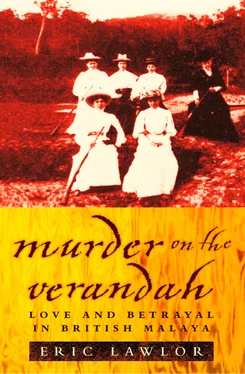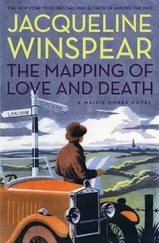Mrs Proudlock, if she did not own one herself, would certainly have been familiar with a print that hung in many Malayan homes: Augustus Egg’s Past and Present No. 1. It depicts a man, slumped in a chair and deep in shock, clutching in his left hand a letter apprising him of his wife’s adultery. His wife, meanwhile, has collapsed at his feet – the collapse as much moral as physical – while his two small daughters, motherless now and little understanding the tragedy that has overtaken them, innocently build a house of cards.
Concupiscence in a wife was considered monstrous, not least because it threatened the social and moral order. During sex, men liked to believe, a woman gritted her teeth and tried valiantly to think of higher things: her garden, perhaps, or her needlepoint. An adulteress was worse than a whore who, very often, could blame her degradation on poverty. A middle-class woman had no such excuse. She was a person of means, even if, in most cases, those means belonged to her husband.
In British Malaya, as in other parts of the empire, the erring woman was an object of such revulsion that even murder inspired less horror. During the trial, the British were not nearly as concerned that Mrs Proudlock had killed a man as they were that she might have broken her marriage vows. Ethel knew this as well as anyone which is why, speaking through her lawyer, she told the court that as much as her life meant to her, her reputation mattered more. It is also why the Mail expressed such satisfaction when Sercombe Smith gave the allegations of adultery short shrift. ‘The insinuations made against the moral character of Mrs. Proudlock were very serious,’ said the paper, ‘and we will be supported by everyone when we express our pleasure at their withdrawal and the manner in which [the judge] laid emphasis on the fact that she was completely cleared of any such imputation.’
While ‘Irishman’ and others like him continued to proclaim Ethel Proudlock’s innocence, while petitions circulated and defence funds were set up, while cables were sent to the British king, and people demanded a return to the jury system, there were those who believed that the condemned woman had got her just desserts.
Rumours abounded. It was whispered that Ethel had been in love with Steward for over a year and had been seen more than once hurrying to his home in Salak South; that she despised her husband and longed to be rid of him; that she and Steward had meant to elope.
It was also claimed that she had had not just one affair, but several – and some of those concurrently. In one of the more sensational versions of what supposedly transpired that night, it wasn’t Ethel who killed Steward, but a second suitor who, dropping by on a whim, took it amiss that another was making free with the object of his affections.
The source of this story was an Indian nightwatchman who, minutes after hearing the shots, claimed to have seen a fully-dressed Englishman swim across the Klang river, then in flood and swarming with crocodiles. Since Ethel now had a corpse on her hands, fleeing like that was hardly gallant, but because the killer was a favourite of hers – the story gets more and more outlandish – she sacrificed herself to save him, telling the police it was she who pulled the trigger.
In another version, no less bizarre, William Proudlock was the killer. Having learned that his wife had taken a lover, he set a trap for Steward that Sunday, waiting in the hedge until the miner turned up and then dispatching him. Why, then, did Mrs Proudlock stand trial? Because, this story goes, her husband threatened to expose her: unless she admitted to the crime, he would reveal her to the world as an adulteress.
So many theories. For most, the temptation to speculate was irresistible. Even Mabel Marsh succumbed. According to Marsh, the normally sensible headmistress at KL’s Methodist Girls’ School, it was William Proudlock who had tired of Ethel, not the other way around, and it was he who wanted a divorce. But how? The lady was above reproach. So Will recruited Steward and a plan was hatched: Steward would go to the bungalow, seduce Ethel, and Will would ‘discover’ them in flagrante. But the fates willed otherwise, and when Will got home, after being delayed by all that rain, Steward was already cold.
In a letter to the Mail, one man dismissed these stories as mean-spirited and vicious and accused his countrymen of lacking chivalry. ‘How men can attack a defenceless woman in her darkest hour of overwhelming grief is a mystery,’ he wrote. ‘Surely such conduct is altogether inconsistent with the conduct of a man and that of a gentleman.’
As the controversy grew, even Sercombe Smith came in for criticism. The charges became so virulent in some cases that the Mail had to tell its readers to desist. While it sympathized with Mrs Proudlock, the paper said, ‘we decline to associate ourselves with the hysterical outbursts which have followed the judicial decision … Correspondence has already appeared in our columns touching upon the case, and the opinions of our readers will receive publicity within limits. But for those who have gone to all kinds of adjectival extremes in the attempt to splutter forth their wrath against the judge and assessors, it may be added that their effusions will find the oblivion of the waste-paper basket.’
The attack was now taken up by Capital, a paper published in Calcutta. Describing the trial as ‘a powerful and fearful failure of justice’, Capital said it evoked the worst excesses of Bardell vs. Pickwick. ‘The verdict is ridiculous,’ it went on. ‘If, as the prosecution endeavoured to prove, the man was lured to the house with the intention that he should be shot out of revenge, jealousy or pique, no mercy should be shown. If, on the other hand, the unfortunate woman shot the wretch in defence of her honour, who will dare to say she was wrong? It comes to this: that in the FMS a woman who defends her honour must look for no mercy from a British judge and assessors.’
Sercombe Smith, it said, was a buffoon who had prostituted his office ‘and defiled the ermine which British judges are supposed to wear’. Capital then proposed some rough justice of its own. It was time to apply lynch law, it suggested. Tar and feather the man. And when that was done, string him up.
All this was profoundly gratifying to the Proudlock camp. The authorities, though, were not amused. When the Times of Malaya , a paper published in Ipoh, reprinted the Capital article, the government denounced it as defamatory and went to law. The editor of the Times, having badly underestimated official sensitivities, now tried to make amends. He issued an apology in which he described the article as ‘abominable and scurrilous’. The government was not appeased, however, and, on 31 July, a court ordered the editor to pay a fine of $350.
Horace Bleackley, author of A Tour in Southern Asia, now added to the furore by suggesting that assaults like the one Ethel supposedly endured were not uncommon. Malaya, he said, was full of men like Steward, whom he characterized as one of the many satyrs ‘infecting’ those colonies where men outnumber women. This was considered a low blow, not least because Bleackley made these charges in a letter to London’s Daily Mail. The community was outraged: one of its own had betrayed it. The Malay Mail thought so, too. ‘We are not aware’, the paper said in an editorial, ‘that less respect and consideration are shown for European ladies in communities in Selangor than in an ordinary London suburban community. We may go further than that and say that quite the contrary is the case. We have the idea that nowhere at Home are women more honoured and esteemed than here, and there are no signs that the position held by them for so long is likely to change.’
Читать дальше












